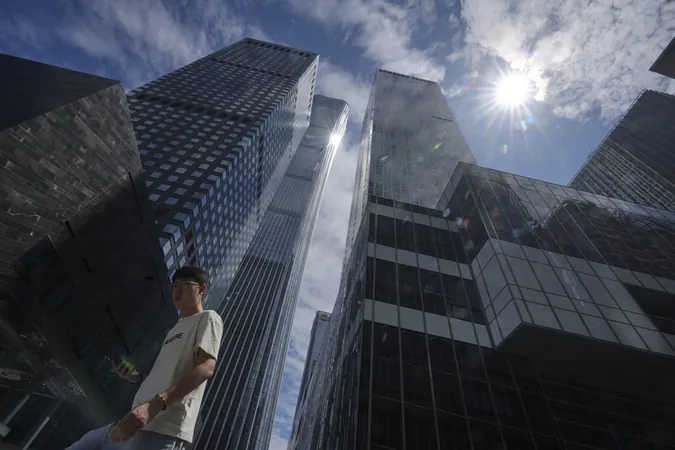
The Stunning Fall of Evergrande: What You Need to Know About Its Delisting in Hong Kong!
2025-08-25
Author: Jessica Wong
Evergrande’s Dramatic Delisting: A Real Estate Giant Falls
In a shocking turn of events, China Evergrande, once a powerhouse in the real estate market, saw its shares delisted from the Hong Kong Stock Exchange on Monday. This marks a significant low point for the company, which has faced overwhelming challenges that are shaking the foundations of China’s property sector.
A Mountain of Debt: Evergrande's Ongoing Crisis
With debts exceeding a staggering $340 billion, Evergrande’s creditors are still grappling with the fallout. This real estate giant, which once soared as China’s second-largest developer, plummeted due to strict regulations targeting excessive borrowing—regulations that sent shockwaves throughout the industry.
Breaking Down the Delisting: What Happened?
The Hong Kong Stock Exchange confirmed that the delisting took effect on Monday morning after Evergrande’s shares were last traded on January 29, 2024. The company was suspended from trading due to a court-ordered liquidation after failing to propose a credible debt restructuring plan. According to exchange rules, if a company’s shares are suspended for 18 consecutive months, they are subject to delisting.
Evergrande's Impact on China's Property Market
Evergrande’s predicament reflects a broader crisis in China's real estate market. In 2020, the Chinese government instated measures, commonly known as the "three red lines," that limited borrowing for heavily indebted developers like Evergrande. This crackdown led to numerous defaults and a significant downturn in the property sector, stoking fears of potential contagion in the global economy.
The Homebuyers' Dilemma: Construction Stalled
Chinese homebuyers often pay upfront for apartments, locking their money in projects that remain unfinished due to Evergrande's financial woes and a wider credit crunch. As construction halted, a ripple effect spread throughout the economy, affecting demand for vital building materials and dampening consumer spending, which is particularly crucial as many families have their wealth tied to property.
Recovery Efforts in a Stagnant Market
Despite a glimmer of recovery in the housing sector, home prices and investments continue to face downward pressure. With real estate historically contributing about 20% to China’s economy, its continued decline poses significant risks.
Government Moves to Revive the Market
In response to the crisis, Chinese leaders are making strides to stimulate the property market. Initiatives include providing loans and incentives to finish existing projects and prompting local governments to purchase unsold apartments for affordable housing. These moves intend to instill confidence among consumers and provide much-needed support to a struggling market.
Evergrande's History: From Boom to Bust
Founded in 1996 by entrepreneur Hui Ka Yan in Shenzhen, Evergrande’s trajectory mirrored the rise and fall of China’s real estate sector. The company went public in Hong Kong in 2009 but filed for Chapter 15 bankruptcy protection in New York City in 2023—a case that was later withdrawn. Currently, with over 90% of its assets in mainland China, recouping debts from creditors has proven incredibly challenging.
Current Status: Liquidation and Asset Sales
As of July 31, 2023, Evergrande's liquidators reported receiving claims amounting to a staggering $45 billion, far exceeding previous estimates. They have seized control of over 100 companies in the group, with combined assets valued at $3.5 billion. To date, a mere $255 million in assets has been sold, which the liquidators labeled as "modest,” indicating a long and arduous recovery ahead.
The fate of Evergrande serves as a cautionary tale, symbolizing the fragility of an economy that once thrived on real estate. As the dust settles, the world watches to see what happens next in this unfolding saga.

 Brasil (PT)
Brasil (PT)
 Canada (EN)
Canada (EN)
 Chile (ES)
Chile (ES)
 Česko (CS)
Česko (CS)
 대한민국 (KO)
대한민국 (KO)
 España (ES)
España (ES)
 France (FR)
France (FR)
 Hong Kong (EN)
Hong Kong (EN)
 Italia (IT)
Italia (IT)
 日本 (JA)
日本 (JA)
 Magyarország (HU)
Magyarország (HU)
 Norge (NO)
Norge (NO)
 Polska (PL)
Polska (PL)
 Schweiz (DE)
Schweiz (DE)
 Singapore (EN)
Singapore (EN)
 Sverige (SV)
Sverige (SV)
 Suomi (FI)
Suomi (FI)
 Türkiye (TR)
Türkiye (TR)
 الإمارات العربية المتحدة (AR)
الإمارات العربية المتحدة (AR)